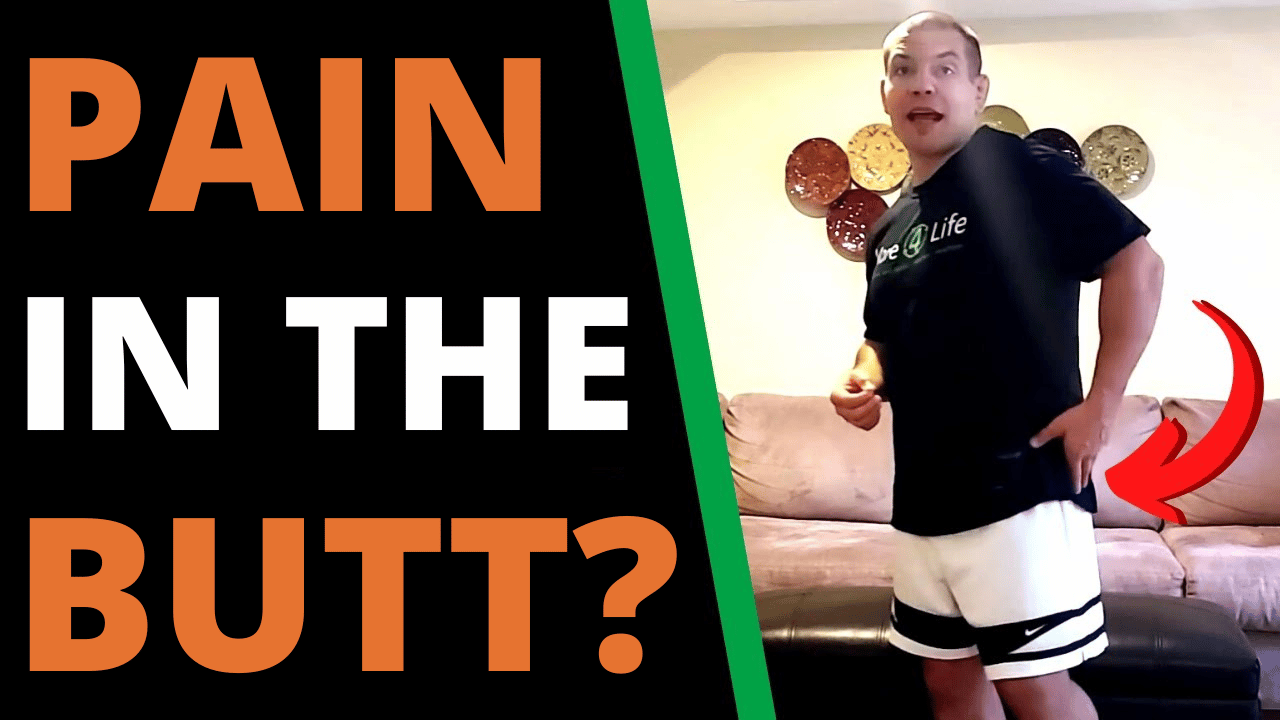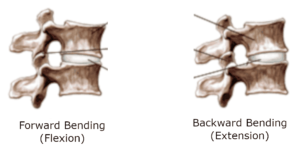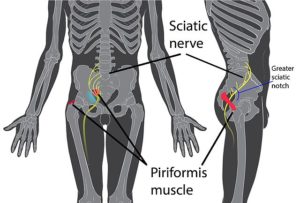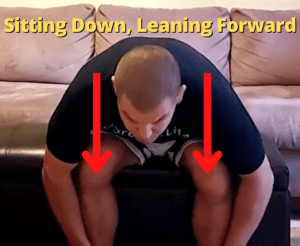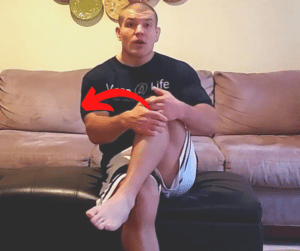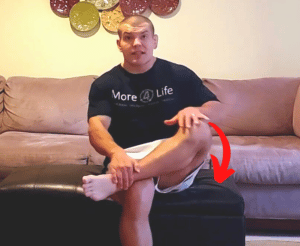Watch the video below to learn how to stop a nagging pain in your butt.
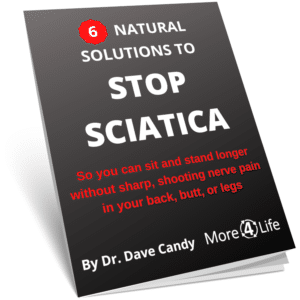
In this post, you'll learn:
- What causes pain in the butt?
- How to tell what's causing YOUR pain
- How to stop that nagging ache in your backside
What Kind Of “Pain In Butt”?
To clarify, I mean pain actually the gluteal muscles, outside of the hips, or lower-back area.
If your pain is more in the anus or colon area, that's not the topic of this post, but I'll briefly cover it below.
Is Buttock Pain A Sign Of Cancer?
If you DO fall into the rectum pain category though, don't get too worried just yet.
Many people who have pain in their rectum immediately worry about colon cancer. However, there are other things more likely than that that can cause rectal pain such as diverticulitis, benign colon polyps, hemorrhoids, or anal fissures.
It's still worthwhile to check with your doctor and/or get a colonoscopy just to be safe, especially if you're over 50. But don't start thinking the worst until you've got a diagnosis.
In this post, however, I'll focus primarily on the neuromusculoskeletal causes of pain in the butt.
Causes Of Pain In The Butt
Generally, there are a few musculoskeletal and nervous system causes for buttock pain.
Lower Back Joints & Muscles
The first, most common type of butt pain you may be experiencing could be referred from the lower back joints and muscles.
As you age, you lose height between the discs (white material in image below) in your spine. This is referred to as degenerative disc disease.
Degenerative disc disease can cause the facet joints in the back of the spine to press on one another.
Standing with too much back arch or backward bending cause the facet joints to further push on one another, which can refer pain to the butt area.
Your lower back muscles such as your lumbar multifidi, quadratus lumborum, or psoas can also refer discomfort to the butt.
Doing lower back pain stretches can take pressure off of the joints and muscles in the lower back and help relieve butt pain or discomfort.
Nerve Pain & Impingements
If you have discomfort in your butt that refers into your leg past the knee, your pain is likely being caused by the lower nerve roots in your back. More specifically, the L5 and S1 nerve roots are the most common causes of pain in the butt.
Your buttock pain could also be caused by the sciatic nerve itself. Your sciatic nerve is formed by the L4, L5, S1, S2, and S3 nerve roots. It then runs down through your pelvis under the piriformis muscle, which can irritate the trunk of the sciatic nerve itself.
Weak Gluteal Muscles
Pain in the butt doesn't always come from the lower back though.
Sometimes this pain can also be caused by the butt muscles (gluteal muscles) themselves.
Trigger points in your gluteus maximus can cause pain in the back of your butt. On the other hand, trigger points in the gluteus medius or minimus muscles can cause pain in the side of your butt.
If you have weak gluteal muscles they may not be able to keep up with the demands of your recreational activities, or sometimes even just your everyday activities.
This can cause trigger points to develop within the gluteal muscles, which are basically painful knots in the muscles.
Treatments such as manual trigger point therapy or dry needling can be helpful to release painful trigger points in the gluteal muscles.
Stiff Hamstrings Can Cause Butt Pain Too
Additionally, your hamstring muscles from the back of the leg attach to the butt bones or "sits bones" that you sit on. These can be a source of buttock pain, particularly for people who have pain when sitting on hard surfaces.
In this case, using a seat cushion and/or stretching your hamstrings may help.
Need Help For Butt Pain?
If you'd like to discover what's causing your pain and what you can do to stop it, click the button below to request a FREE Pain Discovery Visit
How To Tell What's Causing YOUR Pain
Butt Pain From Lower Back Joints & Muscles
The first way of telling what kind of pain in the butt that you have, is by seeing if you get a lot of pain from leaning backwards, or compressing your back together.
If leaning backwards reproduces your butt pain, then it's likely being caused by compressed joints in the lower back onto your butt area.
Furthermore, if bending forwards, or sitting down also helps to relieve the your butt pain, then the pain is probably originating from your back muscles or joints.
To solve this problem, simply using a combination of forward-leaning stretches and sitting down more often can help to relieve your butt pain.
A combined stretching approach to this problem would be sitting down while leaning forwards. This method should help to relieve pressure in your back, and therefore pain in your butt area.
Butt Pain From Pinched Nerves In Your Lower Back
If you have bulging, herniated, or degenerative disc in your back, that can put increased pressure on the nerve roots that form the sciatic nerve. Additionally, stiff hip flexor muscles can compress the nerve roots in the lower back.
Both of these problems can refer pain into the butt.
Doing the lower back stretches shown above can help to open up the spaces in the back where the nerve roots exit the spine.
Additionally, your hip flexor muscles create massive amounts of compression on your lower back vertebrae. Stretching your hip flexors can take some of the pressure of of the vertebrae, discs, and nerves in your lower back and help relieve the pain in your butt.
Butt Pain From The Sciatic Nerve
When a pain in the butt comes from the sciatic nerve itself (where it exits the hip), often the sciatic nerve may be compressed by the piriformis muscle being too stiff.
However, I find more commonly, people will actually have many of their hip muscles too weak or loosened. That means that the muscle is getting OVERSTRETCHED every time you put weight on your leg to take a step. As the muscle gets stretched tight across the back of the hip, this can irritate the sciatic nerve.
Therefore, depending on the kind of problem you’re experiencing, the proper treatment may be quite different.
If your piriformis muscle is too short or stiff, it's a good idea to do piriformis stretches. The stretches shown below help to stretch the piriformis muscle.
Additionally, doing sciatic nerve glides can help buttock pain from the sciatic nerve.
However, if your sciatica stems from having loosened or weak hip muscles, then it’s a good idea to focus on hip strengthening exercises instead of stretching.
Long-Term Solutions For Pain In Butt
Doing stretching and strengthening exercises can help relieve your pain. However, although these things will help you feel good for a period of time, they often don't provide lasting relief from buttock discomfort or pain.
In order to find a long-term solution, you need to determine the root cause of your buttock pain.
Now, I don't just mean the structure that's causing your pain such as the joint, muscle, or nerve that's involved.
What I mean by root cause is...
Why did that structure start to hurt in the first place?
Oftentimes just small differences in the ways that you do everyday activities such as sitting, standing, walking, bending, or lifting can make huge differences in buttock pain.
If you'd like to discover the root cause of your pain and how you can get rid of it for good click the button below to request a FREE Pain Discovery Visit with one of our specialists
Like this post? See our other posts about sciatica
Such as:
What Causes Pain In Thigh Muscle?

